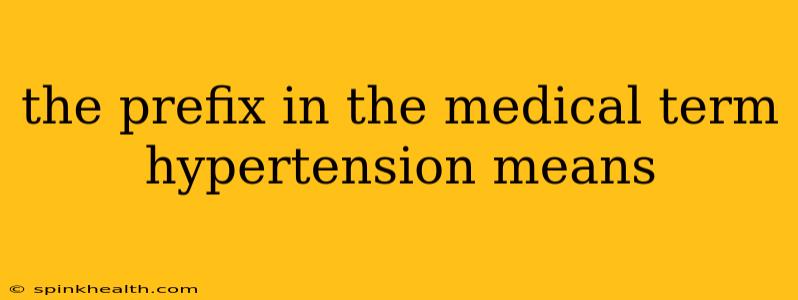Decoding Hypertension: Understanding the Prefix "Hyper-"
The medical term "hypertension" might sound intimidating, but understanding its parts simplifies its meaning. Let's unravel the mystery, starting with its prefix. Imagine yourself as a medical detective, carefully piecing together the clues embedded within this word.
The prefix "hyper-" in "hypertension" holds the key to the condition's core nature. It signifies above or beyond normal limits. It's not just a slight elevation; it's a significant increase beyond the typical range. Think of "hyperactive"—someone beyond their usual activity level—or "hyperbole"—exaggeration beyond the truth. These examples illustrate the core meaning of "hyper-."
Now, let's delve into the rest of the word. "Tension" refers to pressure, specifically blood pressure in this medical context. Putting it all together, hypertension literally means "above normal blood pressure."
What does hypertension mean exactly?
Hypertension isn't just a high blood pressure reading on a single occasion. It's a persistent elevation in blood pressure, significantly increasing the risk of serious health problems. This sustained high pressure forces the heart to work harder, straining blood vessels and organs.
What are the potential consequences of hypertension?
The sustained high blood pressure associated with hypertension puts significant stress on your cardiovascular system. Over time, this can lead to:
- Heart disease: Hypertension is a major risk factor for coronary artery disease, heart attacks, and heart failure. The constant pressure damages the arteries, hindering blood flow to the heart.
- Stroke: High blood pressure weakens blood vessels in the brain, making them prone to rupture or blockage, leading to stroke.
- Kidney damage: High blood pressure can damage the delicate blood vessels in the kidneys, impairing their ability to filter waste products. This can lead to chronic kidney disease.
- Vision problems: High blood pressure can damage the blood vessels in the eyes, potentially leading to vision loss or blindness.
How is hypertension diagnosed?
Diagnosing hypertension involves several steps. Your doctor will take multiple blood pressure readings over several visits to confirm a consistent elevation. They will consider factors like your age, family history, and lifestyle.
What are the risk factors for hypertension?
Various factors increase the risk of developing hypertension. These include:
- Family history: A family history of hypertension significantly increases your risk.
- Age: Risk increases with age.
- Obesity: Excess weight strains the cardiovascular system, contributing to higher blood pressure.
- Lack of physical activity: Regular exercise is crucial for maintaining healthy blood pressure.
- Unhealthy diet: A diet high in sodium and saturated fats can contribute to hypertension.
- Smoking: Smoking damages blood vessels and increases blood pressure.
- Excessive alcohol consumption: Excessive alcohol intake elevates blood pressure.
- Stress: Chronic stress can contribute to high blood pressure.
Can hypertension be treated?
Yes, hypertension is manageable. Treatment often involves lifestyle modifications like diet changes, increased physical activity, and stress management techniques. In many cases, medication is also necessary to help control blood pressure.
Understanding the prefix "hyper-" is the first step towards understanding hypertension. It reveals the core meaning of this serious condition and emphasizes the importance of early detection and management for a healthy and longer life.

